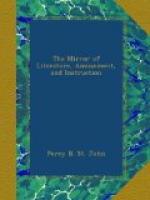Petrarch, in my opinion, was one of the most amiable men that ever lived;—I know nothing about Laura, or her ten children; I agree with those who believe the whole was a dream or an allegory; and, I half suspect that Shakspeare thought so too, and following a fashion, addressed his own sonnets to some like persons; at any rate, no one knows about either much more than I do;—certainly Petrarch’s real love had more real consequences. Petrarch was a sincere Christian, without intolerance—a sound patriot, without austerity; who neither wasted his feelings in the idle generalities of philosophy, nor restricted them to the narrow limits of a party or faction;—he was just, generous, affectionate, and gentle. All his sonnets together do not shed a lustre on him equal to the sincere, single-hearted, mild, yet uncompromising spirit that breathes throughout the letters of advice and remonstrance, which, not idly or obstrusively, but under the sanction and authority of his great name, and the affectionate regard professed for him, he addressed to all whom he believed influential either for good or ill; from Popes and Emperors, to the well meaning insane tribune of Rome.
We went after this to see his tomb, which is honourable without being ostentatious: a plain stone sarcophagus, resting on four pillars, and surmounted by a bust; suited to the quiet of his life, his home, and his resting-place. I passed altogether a day that will shine a bright star in memory; and we wandered about there, unwilling to leave it, until long after the ave-maria bell had tolled, and were obliged in consequence to get a guide, and return by another road through the marshes, where I first saw those fairy insects the fire-flies, and thousands of them. For this we are detained the night at Monselice, and must rise the earlier, for we have written to ——, fixing the day of our arrival at Florence.
* * * * *
THE SILENT ACADEMY, OR THE EMBLEMS.
From the French.
(For the Mirror.)
There was at Amadan, a celebrated academy, the first statute of which was contained in these terms. “The Academicians think much, write little, and speak but as little as possible.” They were called “The Silent Academy,” and there was not a man of learning in all Persia but was ambitious of being admitted of their number. Doctor Zeb, author of an excellent little work, entitled “The Gag,” understood in his distant province that there was a vacant place in the Silent Academy. He set out immediately, arrived at Amadan, and presenting himself at the door of the hall, where the members were assembled, he desired the doorkeeper to deliver to the president, a billet to this import, “Doctor Zeb humbly asks the vacant place.” The doorkeeper immediately acquitted himself of his commission, but, alas! the doctor and his billet were too late, the place had been already filled.




